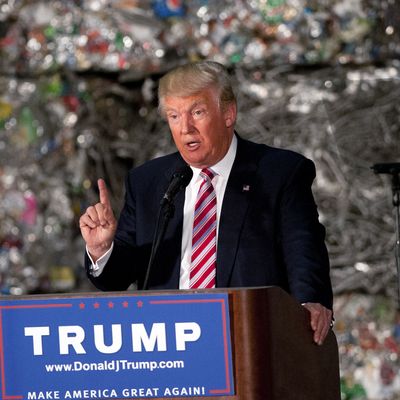
Today, standing in front of a pile of crushed cans, Donald J. Trump gave his most compelling economic-policy speech yet.
That’s not to say that the speech was coherent, to be clear. It overlooked simple facts about American manufacturing, and it offered up an ineffectual set of sound-good, work-bad policies. But it did get to something true, and real: Trade deals pushed by both Democrats and Republicans have inflicted a lot of pain on a certain set of America’s workers. Still, nothing Donald Trump is proposing would do much to help them.
Trump’s speech started in on a familiar populist bent, roving the anti-trade, anti-globalization territory where the presumptive nominee overlaps with Bernie Sanders. “Our politicians have aggressively pursued a policy of globalization — moving our jobs, our wealth, and our factories to Mexico and overseas. Globalization has made the financial elite who donate to politicians very wealthy. But it has left millions of our workers with nothing but poverty and heartache,” Trump said today, according to his prepared remarks. “For years, [politicians] watched on the sidelines as our jobs vanished and our communities were plunged into depression-level unemployment.”
He’s got a point. Granted, the United States is much wealthier than it was back in the 1990s. But any number of factories did move overseas, taking millions of jobs with them. Trade with China and other countries has caused serious and long-lasting dislocations in a number of local labor markets — parts of Ohio, Pennsylvania, Michigan, and North Carolina come to mind. No policy has stepped in to meaningfully help those workers rebuild their lives attached to new industries and to revitalize those areas.
So what does Trump suggest we should do to revitalize American manufacturing and to heal those hollowed-out communities? He’s got a seven-point plan: Withdraw from the Trans-Pacific Partnership, get better trade negotiators, bump up enforcement, renegotiate NAFTA, label China a currency manipulator, bring cases against China, and perhaps impose tariffs. The problem is that absolutely none of those changes would bring those manufacturing jobs back. None of those policies would revitalize Detroit or Pittsburgh. None of those policies would convince multinationals to relocate to the United States.
That is because the manufacturing jobs that got taken offshore in the past few decades tended to be relatively low-skill and low-wage. To get them back, it would need to be cheaper for businesses to hire workers and produce goods in Pennsylvania than it would be for them to hire workers and produce goods elsewhere. That seems unlikely to happen — even if Trump hit certain countries with huge tariffs. Let’s say Trump slapped Chinese producers with new duties, for instance. Wouldn’t it make more sense for businesses producing goods in China to move those jobs to, say, Bangladesh or Vietnam or Ethiopia or anywhere else? Is Trump going to hit everyone with tariffs? Wouldn’t that just raise prices in the United States in a way that would sap all lower-income families?
The emotional appeal is right, as is the diagnosis that globalization created a whole mess of losers as well as a number of winners. But the policy cure is pure crazy.
Even so, it will be interesting to watch whether Trump’s anti-globalization, anti-trade, pro-tariff stance undercuts or even changes one of the mainstream Republicans’ core economic arguments: that pro-business, pro-trade policies benefit working families. The signs of an intra-party civil war on the issue are already clear. “Republican frontrunner Donald Trump has promised to ‘make America great again.’ He has built his campaign on the notion that our country doesn’t ‘win’ anymore, and that under his administration and his trade policies, the United States would finally start ‘winning’ in the international arena again,” the Chamber of Commerce blasted in response to Trump’s speech. “The path to all that winning starts, he says, by building a big wall and creating big trade barriers. Does a recession sound ‘great’ to you? Do 7 million lost jobs sound like ‘winning?’”
To Trump, it just might.





























